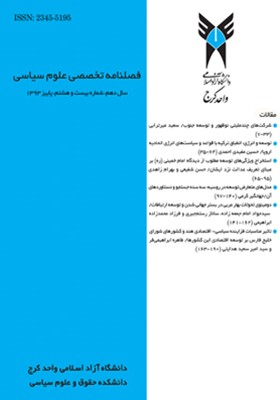تاثیر مناسبات فزاینده سیاسی- اقتصادی هند و کشورهای شورای همکاری خلیج فارس بر توسعه اقتصادی این کشورها
محورهای موضوعی : خاورمیانهطاهره ابراهیمیفر 1 * , سیدامیرسعید هدایتی 2
1 - دانشیار عضو هیات علمی دانشگاه آزاد اسلامی، واحد تهران مرکزی، گروه روابط بینالملل، ایران، تهران
2 - دانشجوی دکتری روابط بینالملل دانشگاه آزاد اسلامی واحد اصفهان (خوراسگان) ،گروه روابط بینالملل، ایران، اصفهان
کلید واژه: توسعه, انرژی, هند, شورای همکاری خلیج فارس, روابط سیاسی و اقتصادی,
چکیده مقاله :
حضور هند در منطقه خلیج فارس ورابطه آن با با کشورهای عرب حاشیه خلیج فارس در طول سالها به یک رابطه پویا توسعه یافته است. با این که که روابط هند با این منطقه به سدههای پیش باز میگردد، اما در سالهای اخیر، هند روابط خود را با کشورهای شورای همکاری خلیج فارس به سرعت گسترش داده است. با ظهور هند به عنوان یک قدرت بزرگ اقتصادی در سالهای اخیر و همچنین رشد اقتصادی منطقه خلیج فارس به طور همزمان، روند اقتصادی وابستگی متقابل را تقویت میکند. هر چند که حضور اقتصادی هند در منطقه از داد و ستد کالا بین بازرگانان به توسعه صنعت نفت خلیج فارس توسط سرمایه انسانی هند تغییر یافته است، حضور سیاسی هند کم و بیش کم اثر باقی مانده است. با این وجود، در فضای متغیر ژئوپلتیکی بعد از جنگ سرد و در چشم انداز امنیتی گسترده از افغانستان تا خلیج فارس، هند به عنوان ژئوپلتیکی بزرگ برای کشورهای خلیج فارس به صورت راهبردی اهمیت یافته است. در بررسی روابط کنونی هند و شورای همکاری خلیج فارس، این سوال مطرح می شود که گسترش روابط سیاسی و اقتصادی بین هند و کشورهای شورای همکاری خلیج فارس چه تآثیری بر توسعه این کشورها دارد؟ در بررسی ها این نتیجه حاصل شد که وابستگی متقابل این کشورها به یکدیگر و نیز مجاورت خلیج فارس و اقیانوس هند سبب تسریع و توسعه روابط بین آنها و در نهایت به توسعه اقتصادی هند و کشورهای شورای همکاری خلیج فارس منجر شده است. هدف از این مقاله بررسی حضور اقتصادی و سیاسی هند در منطقه خلیج فارس و بررسی رشد و توسعه سیاسی-اقتصادی آنها می باشد.
Indian presence in the Persian Gulf and its relations with the Arab states of the Persian Gulf has developed into a dynamic relationship over the years. While India's relations with the region dates back to centuries ago, but in recent years, it's relations with the countries of the Persian Gulf Cooperation Council has expanded rapidly. With the emergence of India as a major economic power in the Persian Gulf region in recent years and economic growth of the Persian Gulf simultaneously reinforce the economic interdependence. Although India's economic presence in the region of barter between the merchants to the Persian Gulf oil industry development has been changed by human capital of India, India's political presence, more or less has been remained as ineffective. However, in the changing geopolitical landscape after the Cold War and from the prospect of widespread security from the Persian Gulf to Afghanistan, India as a major geopolitical country has a strategic importance for the countries in the Persian Gulf. In the study of the current relations between India and the Persian Gulf Cooperation Council, this paper tries to answer the question: what is the impact of the increasing political and economic relations of India and the Persian Gulf Cooperation Council on the development of these countries? The findings of the this study indicates that the interdependence of the countries to each other and also the vicinity of the Persian Gulf and the Indian Ocean has accelerated the development of relations between them and eventually led to the economic development of India and Persian Gulf countries.
منابع فارسی
ام البنین، توحیدی، (1387)،«مناسبات هند با کشورهای حوزه خلیج فارس»، گزارش راهبردی، مرکز تحقیقات استراتژیک، معاونت پژوهشهای سیاست، گروه مطالعات آسیا.
English Source
- BP, (2011), Statistical Review of World Energy, June, London.
- Chanda, Nayan, (2007), Bound Together, London: Yale University Press
- EXIM Bank, (2006), GCC Countries: “A Study of India’s Trade and Investment Potential”, Occasional Paper, No. 110.
- IEA, World Energy Outlook (2007), China and India Insights, Paris: OECD/IEA.
- Indian Consulate in Jeddah, (2008), Available at:
- Karayil, Sajitha Beevi, (2007), “Does Migration Matter in Trade? A Study of India's Exports to the GCC Countries”, South Asia Economic Journal 8, no. 1
- Kellner, Thierry,(2012), The GCC State of the Persian Gulf and Asia Energy Relation, France: Ifri.
- Mohan, C. Raja (2009), “India’s Strategic Challenges in the Indian Ocean and the Gulf”, in: India’s Growing Role in the Gulf Implications for the Region and the United States,Edited by Abdul-Aziz sager and Geoffrey Kemp,Dubai:The Gulf Research Center.
- Mudiam, P.R (2004), India and the Middle East, London: British Academic Press.
- “Official website of the Indian Embassy in Bahrain”, (2008), available at: http://www.indiaembassybahrain.org
- Official website of the Indian embassy in the GCC, (2008).
- Official website of the Indian Embassy in Oman, (2008), available at: http://www.indemb-oman.org
- Official website of the Indian Embassy in Qatar, (2008), available at: http://www.indianembassyqatar,org
- Official website of the Indian Embassy in UAE, (2008), available at: http://www.indembassyuae.org
- Pant, Harsh, (2009),“Looking Beyond Tehran: India’s Rising Stakes in the Gulf”, in: India’s Growing Role in the Gulf Implications for the Region and the United States,Edited by Abdul-Aziz sager and Geoffrey Kemp, Dubai:The Gulf Research Center.
- Pradhan,“India’s Economic and Political Presence in the Gulf: A Gulf Perspective”, Past.
- Pradhan, Samir Ranjan, (2009), “India’s Economic and Political Presence in the Gulf: A Gulf Perspective”, in: India’s Growing Role in the Gulf Implications for the Region and the United States,Edited by Abdul-Aziz Sager and Geoffrey Kemp, Dubai: The Gulf Research Center.
- Pradhan, Samir Ranjan, (2008), India, GCC and the Global Energy Regime: Exploring Interdependence and Outlook for Collaboration, New Delhi: Academic Foundation.
- Website of the Indian Embassy in Kuwait (2008), available at: http://www.indembkwt.org

